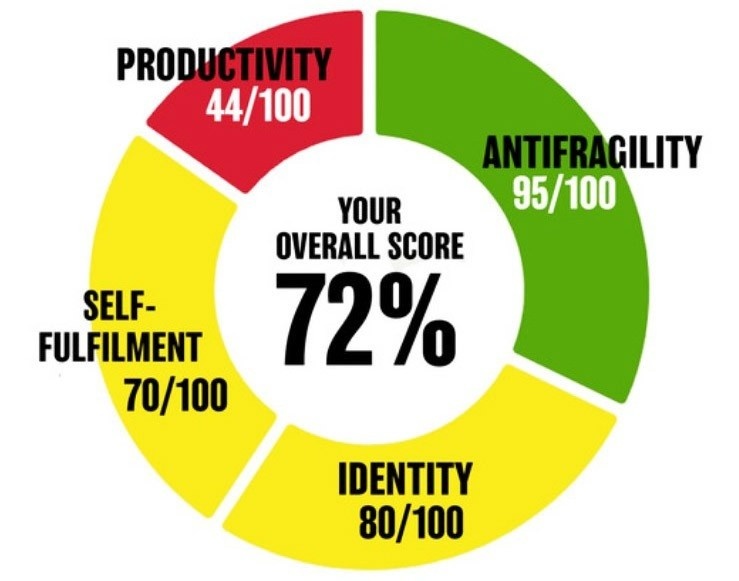SUMMARY
- When someone says that they’re a perfectionist, what they’re really saying is that they are dominated by fear. They think perfectionism is somehow a good thing, but it actually just means they’re afraid.
- The other thing that they’re afraid of is, they’re afraid of failing. They’re afraid that, “If I put my work out there and if it’s not perfect, then I’m going to fail.
- The act of completing something quicker is actually the best way to perfect it. By getting something out the door and in an imperfect state, you can get feedback on that and you can learn how to improve it.
- The 80-20 Rule simply states that 20% of the effort will yield 80% of the results. Now what does a perfectionist try to do? They try to put in a hundred percent effort to get a hundred percent of the result.
- By focusing on, “What’s the 20% of effort that I could put in that would still yield 80% of the result,” it’s a perfect way to train yourself out of your perfectionism.
- Things don’t need to be perfect, they need to be good enough. And often what you think is the necessary standard for good enough, is nowhere near what someone actually needs. They need far less than what you’re thinking.
- Another super powerful technique or tool that you can use to overcome perfectionism, is a simple phrase that I use all the time. And it’s just, “I choose to start for just five minutes.” It helps you take action.
- Starting takes just a moment, whereas finishing takes an indefinite amount of time.
TRANSCRIPT
You think perfectionism is somehow a good thing, but it actually just means you’re afraid. And it’s probably a big driver of your procrastination. And unless you get a handle on this, you’re just simply not going to reach your full potential in business or life.
Hi, my name is Eric Partaker, and I’m on a mission to help entrepreneurs reach their full potential in business and life. And today I’m going to be talking about the relationship between perfectionism and procrastination, and how what you might think is a good thing, is actually the very thing that’s leading to you procrastinating in life, and not moving as quickly as you could be. So stick around for the full message today, so you can benefit from all the tips and techniques, to overcome your perfectionism, which is actually contributing to your procrastination.
Now, I feel particularly well-placed to talk about today’s topic, because guess what? I used to be the world’s worst procrastinator. I mean, I even bought a collection of books on procrastination. And guess what? They sat on my shelf for 10 years, until I decided to finally read them. How much worse can it get than that? And when I finally did start reading the books, I was blown away. I consumed so many techniques and so many methods, and got so many insights into what was driving my procrastination, as well as how to overcome it. And today I’m going to share that with you, so that you can up your game, and start producing at the level that you’re meant to be playing at.
So what is perfectionism? We’ve heard of that classic interview question, you might’ve even said this in an interview yourself when somebody says, “Well, tell me about your greatest failure or your biggest negative quality.” And you’ll hear people say, “I’m a real perfectionist.” As if that’s a good thing. I mean, when I hear that, I think, “Oh my gosh, I’m not going to hire the person.” What they’re saying is as if they think is this hidden strength, I’m like, “Immediately disqualified. Thanks, the interview is over.” And here’s why.
When someone says that they’re a perfectionist, what they’re really saying is that they are dominated by fear. And fear is the number one thing that’s going to hold that person back in life. That’s going to be the primary reason why they’re not going to be a well-performing member of the team. And what is it that they’re afraid of? When someone says that they’re a perfectionist, “I used to be a perfectionist.” What is it that they’re really afraid of? What they’re afraid of is they’re afraid of being judged, right? They’re afraid that somebody is going to think my work isn’t good enough. And when they think my work isn’t good enough, they’re saying, “I’m not good enough,” right? So they’re over identifying with the work.
The other thing that they’re afraid of is, they’re afraid of failing. They’re afraid that, “If I put my work out there and if it’s not perfect, then I’m going to fail. And if I fail, then people are going to judge me. Once again they’re going to think I’m not capable. I’m not good enough. And I don’t want that to happen.” So they insulate that risk by trying to get something so perfect, that it has no chance of failing and no chance of drawing any judgment upon them. But what happens as a result? What happens as a result is the work never really gets out quickly enough, right? I mean, if you are a perfectionist, you know how this feels. You’ll spend ages working on something. And you keep procrastinating because you don’t want to put it out there yet. It’s not ready yet. And you’re worried if you do, once again that somebody might judge it or that it might fail. And then what does that say about you? So the perfectionist is really a procrastinator. And the two go hand in hand together.
Now here’s the funny thing. The act of getting something out the door quicker, is actually the best way to perfect something. By getting something out the door and in an imperfect state, you can get feedback on that and you can learn how to improve that, once it’s out there in the wild so to speak. By keeping it and holding it tight and never showing it to anyone, you have no chance to kind of polish and perfect, or at least improve whatever it is that you’re working on. So how do we improve our perfectionism so that we’re less likely to procrastinate? Well, there’s a handful of things that we can do. And one of the most powerful things… I talk about this in so many instances, simply because this is one of the principles that you can apply to so much in life. And it’s the 80-20 principle. 80-20 is probably out of all the different things that you could do to combat perfectionism, which will improve your procrastination, 80-20 is like the 80-20 of all the methods out there.
So 80-20 simply states that, 20% of the effort will yield 80% of the results. Now what does a perfectionist try to do? They try to put in a hundred percent effort to get a hundred percent of the result. So, I mean, if we do some quick mathematics here. So if something is going to take five hours to do to get it to a hundred percent, the perfectionist will work all five hours to get it there a hundred percent. Whereas a person who’s the executor, the person who’s just going to get it out there, done, ship it as quickly as possible, they’ll spend one hour. 20% of the time knowing that it would be 80% good enough, and they’ll get it out the door. Freeing up four hours in that simple example, where they could be working on something else.
Now, 80-20 is perfect for a perfectionist because it forces you to get your work done at a not perfect level, right? 80% is not perfect. It’s not a hundred percent. So by focusing on, “What’s the 20% of effort that I could put in that would still yield 80% of the result,” it’s a perfect way to train yourself out of your perfectionism. This is actually a tactic that I use myself for over one year. And so what I had, which is a segue to the next topic, was an 80-20 accountability partner. This is simply a friend, and we agreed over the course of a year that every single day, because we were both trying to combat perfectionism. That every single day we would message each other one thing in the course of the day where we had demonstrated that instead of spending a hundred percent effort for a hundred percent of the result, we only spent 20% minimal amount of effort for 80% of the results. And we would text each other that example every day.
And by doing that over the course of a year, I got into the habit of looking for 80-20 opportunities. Looking for, in other words, opportunities in which I could complete or do something in an imperfect way. Opportunities for me to be an imperfectionist rather than a perfectionist. And guess what happened? My results skyrocketed. I started performing a lot better. I started achieving things much more quickly. I was happier because I was producing at a higher level. And I noticed this amazing thing which I referenced earlier as well. That once I got things out and got feedback on them, I started to be able to perfect them or improve them, much more quickly than just sitting there on my own, locked away, trying to make things just right before getting it out the door.
And if you’re listening closely, you might’ve heard that I used a phrase, “Good enough,” earlier when I was talking. That when you 80-20 something you’re saying, “It’s good enough. Let me get that out. Let me set that free.” And that is a key thing to embrace as a perfectionist. Things don’t need to be perfect, they need to be good enough. And often what you think is the necessary standard for good enough, is nowhere near what someone actually needs. They need far less than what you’re thinking. And it’s not like they’re going to get less quality, and it’s going to impair them in some way. Often, especially if you’re a perfectionist, that 80% version of what you originally intended, is not just good enough, it’s great for the average person out there. So set that work free. Get it out there in the wild sooner than you think. Let it flow. 20% of the effort for 80% of the result is often good enough.
And in examples or in instances when it’s not, try to resist the temptation of you doing more work on that 20%. Ask if there’s someone in your group or a friend or a teammate, who could take a shot at that remaining 20%. Have them 80-20 the percent that remains.
And another super powerful technique or tool that you can use to overcome perfectionism, is a simple phrase that I use all the time. And it’s just, “I choose to start for just five minutes.” It helps you take action. There’s loads of things that maybe you don’t want to be doing, that you think just, “I won’t be able to get that just right. I don’t have enough time to make it all perfect. And I can’t possibly start working on that, because it would take me three hours to get it to where I’d like it to be, and I only have 45 minutes right now.” But you can always choose to start something for just five minutes. By using the word choose, you’re putting yourself in the driver’s seat. You’re taking control.
And by focusing on starting rather than finishing, which is where perfectionists’ minds tend to go, you’re focusing on something far easier. Because starting takes just a moment, whereas finishing takes an indefinite amount of time. And by focusing on just five minutes instead of three hours or two hours or whatever it may be, it’s such a micro amount of time. You can’t possibly allow yourself to be perfect in just a five minute space. So the very act of constricting what constitutes success for you by just choosing to start for only five minutes, for just five minutes and having that be good enough, gets you into the habit of just taking action and coming out of that perfectionist tendency.
So I hope you’ve enjoyed that. A collection of techniques and mindsets and tips and tricks that you can use to overcome your perfectionism, because that is seriously holding you back. That is not a good quality. If you’ve ever said this in an interview, don’t ever say that again. It is not something that’s serving you. You need to undo the perfectionism because it’s actually contributing to your procrastination, contributing to your fear. And we can undo it through some of those techniques that I shared today. So I hope you’ve enjoyed that. And I would love to hear in the comments below, what do you do to deal with your perfectionism? How do you see that linking to your procrastination? And do you understand how these two things are linked together to your detriment? So I hope you’ve enjoyed that. And if you head over to my website at ericpartaker.com, you’ll also be able to subscribe to my weekly insights newsletter.




